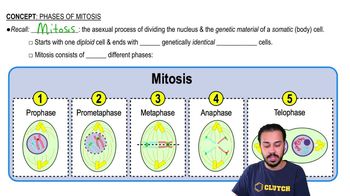Vinblastine is a standard chemotherapeutic drug used to treat cancer. Because it interferes with the assembly of microtubules, its effectiveness must be related to a. disruption of mitotic spindle formation. b. suppression of cyclin production. c. myosin denaturation and inhibition of cleavage furrow formation. d.inhibition of DNA synthesis.
In the cells of some organisms, mitosis occurs without cytokinesis. This will result in a. cells with more than one nucleus. b. cells that are unusually small. c. cells lacking nuclei. d. cell cycles lacking an S phase.
 Verified step by step guidance
Verified step by step guidance
Verified Solution
Key Concepts
Mitosis

Cytokinesis

Multinucleation

One difference between cancer cells and normal cells is that cancer cells a. are unable to synthesize DNA. b. are arrested at the S phase of the cell cycle. c. continue to divide even when they are tightly packed together. d. cannot function properly because they are affected by density-dependent inhibition.
The decline of MPF activity at the end of mitosis is due to a. the destruction of the protein kinase Cdk. b. decreased synthesis of Cdk. c. the degradation of cyclin. d. the accumulation of cyclin.
Which of the following occurs during S phase? (A) condensation of the chromosomes (B) replication of the DNA (C) separation of sister chromatids (D) spindle formation
Cell A has half as much DNA as cells B, C, and D in a mitotically active tissue. Cell A is most likely in a. G1. b. G2. c. prophase. d. metaphase.
